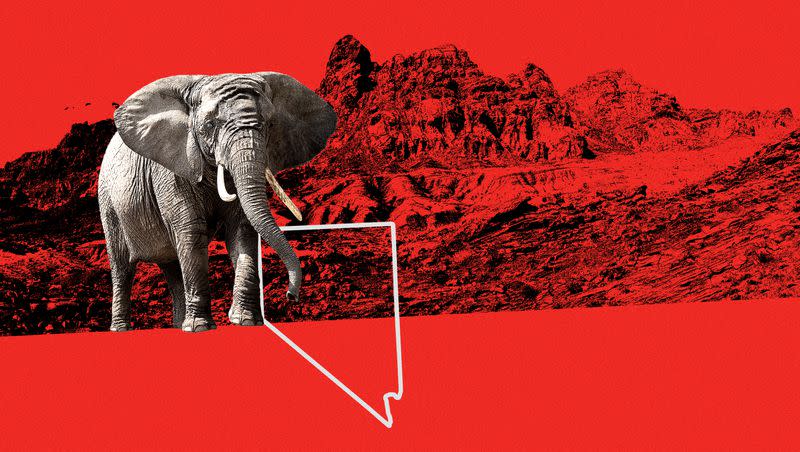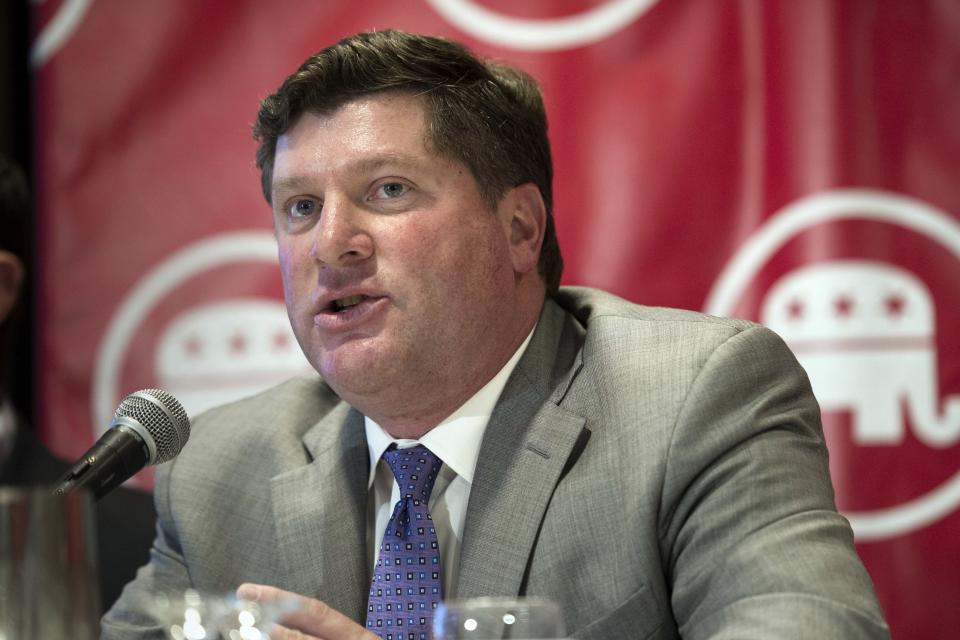Why Mitt Romney’s 2012 Nevada campaign manager went to work for Trump

- Oops!Something went wrong.Please try again later.
- Oops!Something went wrong.Please try again later.
- Oops!Something went wrong.Please try again later.
In early 2012, with the Nevada primary only days away, Mitt Romney traveled to Las Vegas to accept a big endorsement. Donald Trump, the billionaire real estate mogul, would be announcing his support for the Republican candidate.
“There are some things you just can’t imagine happening,” Romney said, standing in the lobby of Trump’s hotel on the Strip. “This is one of them.”
Two days later, Romney cruised to a landslide victory in the Nevada primary election, bolstered by the state’s large Latter-day Saint population. By summer, Romney was the party’s official nominee, and Chris Carr — then the Republican National Committee’s western regional political director — left the RNC to lead Romney’s Nevada campaign.
But by 2016, Romney and Carr had gone in very different directions. Though Romney had written that Trump was “not fake” and “the real deal” in 2012, he now viewed him as a “phony” and a “fraud,” and worked behind the scenes to prevent Trump from winning the Republican nomination. While Carr, once Romney’s Nevada campaign manager, helped Trump win the general election as the RNC’s political director in 2016. Two years later, as Romney continued to criticize Trump while campaigning for the U.S. Senate, Carr joined the Trump campaign as political director, a position he held through the 2020 election.

Why the deviation? While Romney saw Trump as a con man and a criminal, Carr saw Trump as a generational candidate. Carr speaks highly of both Romney and Trump — Romney is “a very, very nice man,” he said — but he notes the excitement surrounding Trump’s 2016 campaign was unlike anything he’d ever seen before.
“Governor Romney’s rallies were good. They were very professional,” Carr told the Deseret News. “But in terms of the size of the rallies, they couldn’t compete (with Trump’s). It was like a Grateful Dead concert.”
Early in the 2016 race, Carr saw the Trump campaign capitalizing on aspects he thought Romney lacked in 2012. Carr attributes Romney’s 2012 loss in Nevada to the Obama campaign’s robust community organizing structure, which prioritized voter registration. At the time, Carr said, Nevada had a large number of people who had never registered to vote, and the Obama campaign keyed in on that group, recruiting and training volunteers to help get them registered.
“Barack Obama was a great candidate,” Carr said. “I wouldn’t say he was a great president, because I disagreed with pretty much everything that he stood for, policy-wise. But he ran a great campaign.”
In the years following Romney’s 2012 loss, Carr dedicated himself to voter registration initiatives. In 2013, he launched Engage Nevada, a 501(c)(4) that focused on helping Nevadans register to vote and learn conservative principles. In 2014, he helped Nevada Republicans win the midterm elections in a landslide. “We stole what we learned from the Obama campaign, tactics-wise,” he said.
The following February, Carr relocated to Washington, becoming the RNC’s national political director. Four months later, Trump announced his campaign.
“I can tell you right now, in February of 2015, I would have never predicted Donald J. Trump was going to be our nominee,” Carr said.
But in the subsequent months, Carr began to notice something different with Trump’s appeal. Not only was he drawing huge crowds to his events, but he was bringing in individuals who hadn’t voted for Republicans in previous elections. By that December, in a meeting with senior RNC staff, Carr predicted that Trump would be the party’s nominee.
Trump did win the nomination, and Carr helped broker a relationship between the existing Trump campaign and the RNC’s political arm. The Trump campaign already had a strong grassroots mechanism in place, and it was initially skeptical of the RNC’s help; eventually, Carr convinced the Trump team that the RNC could expand its efforts.
In the final months of the 2016 campaign, Carr helped Trump implement many of the same on-the-ground tactics he’d learned from Obama in 2012. Carr required all RNC political employees to read “Groundbreakers,” a book about Obama’s volunteer strategy. He prioritized recruiting and training volunteers in each state, and he pushed face-to-face interactions with volunteers.
“We were better at the Obama field program, that type of model, than the Hillary Clinton people were,” Carr said.
As the 2024 election approaches, Carr is no longer with the RNC, and he isn’t advising or working for any campaign. Trump maintains significant leads in polls of Republican voters, and it is probable that a Biden-Trump rematch awaits. But Trump also faces a long list of criminal charges, and the Supreme Court is set to decide whether his role in the Jan. 6, 2021, riots can bar him from holding office.
Meanwhile, Trump continues his feud with the RNC itself, refusing to participate in any of its primary debates and souring on RNC Chair Ronna McDaniel.
Carr said the tension is being blown out of proportion, noting that Trump’s top campaign staffers — including Susie Wiles and Chris LaCivita — are “top professionals” who maintain strong ties to the party.
“I don’t think (Trump’s relationship with the RNC) is as bad as some people make it out to be,” Carr said. “When you’re a nominee, you do need the national party.”

